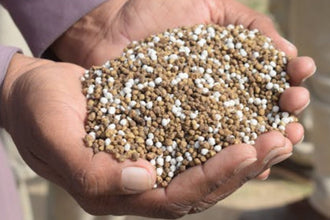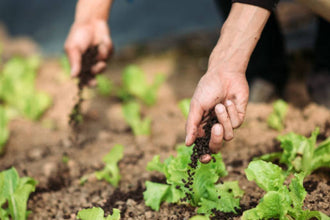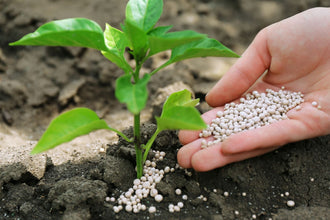
Garlic, a staple in many cuisines, relies heavily on the right fertilization to thrive. Choosing an effective organic fertilizer can create a significant impact on the yield and health of this essential crop.
This approach not only embraces the benefits of organic farming but also supports and nourishes the soil in the most natural ways. Let's explore how to enhance your garlic garden with suitable organic fertilizers that cater to the specific nutrient demands of your garlic.
Understanding Garlic's Nutritional Needs
For your garlic crop to flourish, it's essential to comprehend their particular nutritional needs. Full of flavor and health benefits, garlic plants require a generous supply of nitrogen for best growth. Other crucial nutrients include phosphorus for healthy root development, potassium for general plant vigor, and sulfur to produce their characteristic aroma and flavor.
Choosing the right soil to plant your garlic is also fundamental. This crop prefers well-draining, fertile soil with a neutral pH. Soil rich in organic matter can provide many of the nutrients garlic needs. Additionally, the soil temperature and moisture levels greatly affect the plant’s growth and bulb formation. Therefore, understanding your soil type and preparing it appropriately before planting your garlic will result in an abundant and hearty yield.
Types of Organic Fertilizers for Garlic
Cultivating garlic requires rich, well-drained soil and proper nutrients to ensure healthy growth. Organic fertilizers are the perfect supplement to enrich the soil with essential nutrients.
These are composed of natural materials and do not contain synthetic chemicals, making them environmentally friendly. We can categorize these organic fertilizers into three primary types: animal-based fertilizers, plant-based fertilizers, and mineral-based organic fertilizers.
Animal-Based Organic Fertilizers
Animal-based fertilizers are rich in nitrogen, one of the vital nutrients needed for plant growth. They are derived from animal waste, remains, or by-products.
- Manure: This is a commonly used organic fertilizer from the waste materials of animals like cows, horses, and chickens. Manure is rich in nitrogen and can significantly enhance the fertility of the soil when applied in moderation.
- Bone Meal: Derived from ground animal bones, this fertilizer is rich in phosphorus, aiding in root development. It also provides a small amount of slow-release nitrogen.
- Fish Emulsion: Fish emulsion is an excellent source of quick-acting nitrogen. However, it needs to be applied more frequently due to its fast-release nature.
Plant-Based Organic Fertilizers
Plant-based fertilizers are derived from plants themselves. They decay over time, releasing nutrients into the soil as they decompose.
- Compost: Compost is created from decomposed organic matter like vegetable scraps, leaves, and grass clippings. It enhances the soil structure and provides a variety of essential nutrients for plant growth.
- Cover Crops/Green Manure: These are plants that are grown to be tilled back into the soil. They enhance soil health by adding organic matter and nutrients and also help prevent erosion.
- Cottonseed Meal: This by-product of the cotton industry is rich in nitrogen and can be used as a slow-release fertilizer.
Mineral-Based Organic Fertilizers
Mineral-based organic fertilizers are made from naturally occurring mineral deposits. They provide specific nutrients that plants need in various growth stages.
- Greensand: Greensand is formed from mineralized seaweed and is a rich source of potassium. It also helps improve the soil's water holding capacity.
- Rock Phosphate: A natural source of phosphorus, it helps stimulate root development and is beneficial during the flowering stage.
- Epsom Salts: Epsom salts provide sulfur and magnesium, two crucial nutrients that can boost garlic's overall health and flavor.
By understanding these different types of fertilizers, you can better cater to your garlic's nutritional needs, promoting vibrant and healthy garlic growth and yield.
Benefits of Using Organic Fertilizer for Garlic
Organic fertilizers offer a myriad of benefits not only for garlic crops but also for the environment and personal health. Below, we'll explore these benefits in detail:
Environmental Impact
By using organic fertilizers, you're employing a method that's harmonious with nature. These natural amendments:
- Reduce Chemical Runoff: Unlike synthetic options, organic fertilizers break down naturally, leading to less nutrient runoff into nearby waterways, thus reducing pollution.
- Lower Energy Consumption: The production of organic fertilizers uses significantly less energy compared to the manufacturing of chemical fertilizers.
- Encourage Sustainable Practices: Organic fertilizers support sustainable farming practices that preserve the longevity of the land and environment.
Health Benefits
With organic fertilizers, the garlic produced:
- Minimizes Chemical Exposure: By not using synthetic inputs, organic garlic contains fewer chemical residues, which is safer for consumers.
- Enhances Nutritional Value: Organic fertilizers can lead to vegetables with higher levels of certain vitamins and minerals due to the improved health of the soil.
Soil Health and Biodiversity
Organic fertilizers are known for their soil-enriching properties:
- Improves Soil Structure: Adding organic matter to the soil improves its texture, aeration, and water-holding capacity.
- Supports Microbial Life: Organic fertilizers feed the soil microbes, leading to a vibrant, living soil that assists in nutrient breakdown and uptake by plants.
- Promotes Biodiversity: Healthy, organically fertilized soils support a wide range of organisms, from beneficial insects to earthworms, which is crucial for a balanced ecosystem.
How to Apply Organic Fertilizer to Garlic
To get the most out of your organic fertilizer and to ensure the best growth for your garlic, it's important to follow certain practices:
Pre-planting Soil Preparation
- Soil Testing: Before planting, test your soil to determine its existing nutrient levels and pH. This information will guide you on the correct organic amendments needed.
- Incorporate Compost: Work in well-rotted compost to enrich the soil with nutrients and organic matter, setting a fertile stage for garlic to grow.
Application Rates and Timing
- Follow Guidelines: Each type of organic fertilizer comes with recommended application rates. It’s important to follow the instructions to prevent over-fertilization.
- Staggered Application: Apply granular fertilizers a few weeks before planting and again as a top dressing during active growth after the garlic has established.
Additional Care and Maintenance
- Mulching: Apply straw mulch after planting, which conserves moisture, suppresses weeds, and provides additional slow-release nutrients as it breaks down.
- Regular Monitoring: Observe your garlic plants regularly for signs of deficiencies or stress. Insufficient nutrients may manifest as stunted growth or pale leaves.
- Water Wisely: Garlic requires sufficient water during the growing season, especially once bulb formation starts. Water deeply and infrequently to promote healthy root growth.
By embracing organic fertilizers and thoughtful cultivation practices, you'll not only enjoy an abundant garlic harvest but also contribute to a healthier ecosystem and potentially better health for those who enjoy your garden's bounty.
Tips for Making Your Own Organic Garlic Fertilizer
Creating your own organic garlic fertilizer is a sustainable and cost-effective way to nourish your plants. Here are some tips to get you started:
- Compost Essentials:
- Start a compost pile with kitchen scraps such as fruit and vegetable peels, coffee grounds, and eggshells.
- Balance your compost with green materials (kitchen scraps) and brown materials (dry leaves, shredded paper).
- Turn the pile regularly to aerate and speed up decomposition.
- Household Waste as Fertilizer:
- Use banana peels for potassium; dry and grind them before sprinkling around your plants.
- Save and cool your cooking water from boiled vegetables; it's rich in nutrients and can be used for watering your garlic plants.
- Crush eggshells into fine particles; they offer calcium, which helps in the development of plant cell walls.
A well-balanced, homemade organic fertilizer not only nurtures your garlic but also recycles kitchen waste, reducing your environmental footprint.
Conclusion
Choosing the perfect organic fertilizer for garlic is crucial for yielding a healthy and bountiful harvest. As we've explored, numerous natural options boost garlic's growth while nourishing the soil. By opting for organic methods, gardeners embrace both the well-being of their crops and the environment.
Remember, the key is to provide your garlic with an ample but balanced diet of essential nutrients. For those environmentally-conscious cultivators seeking high-quality organic solutions, Fancy Chicken offers pelletized organic chicken manure fertilizer, which is rich in nutrients and perfect for garlic cultivation.
If you're looking to give your garlic crop a natural boost, consider Fancy Chicken's pelletized organic chicken manure fertilizer. This excellent organic option is not only rich in nutrients essential for robust garlic growth, but it's also an eco-friendly choice that supports the health of your soil.
Click here to explore our organic fertilizers that can make your garlic flourish. Choose a responsible and effective way to nourish your plants with Fancy Chicken.









